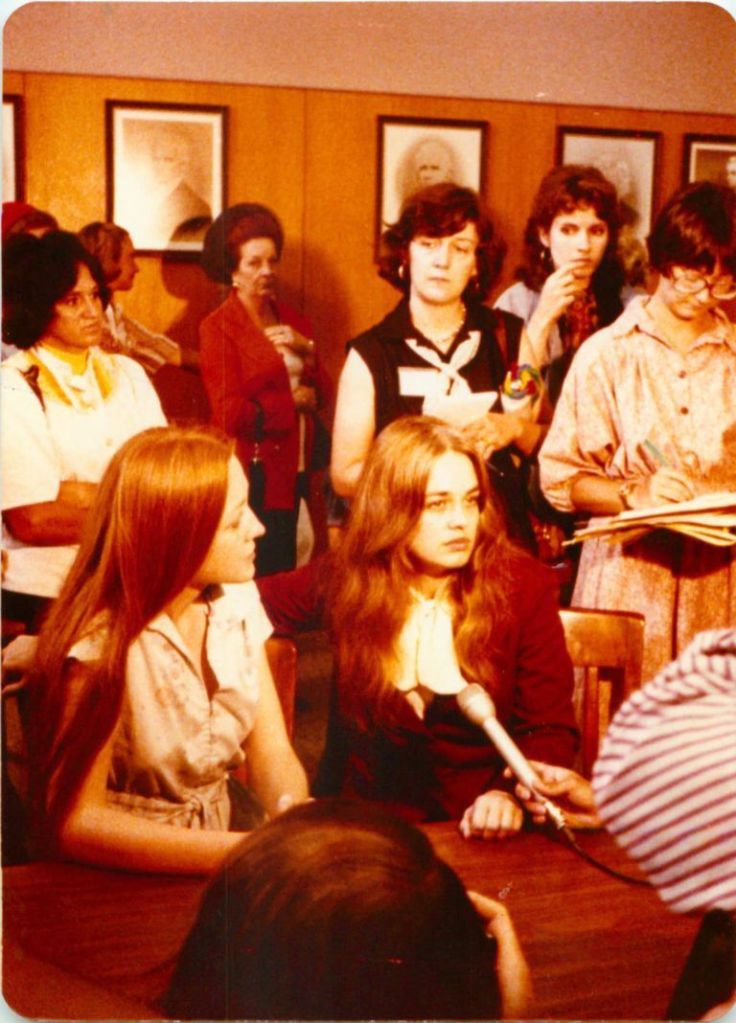When Bowling Green was abortion battleground
Published 12:15 am Sunday, July 3, 2022

- Attorney Flora Templeton Stuart (seated, right) and Marla Pitchford speak with reporters following Pitchford’s 1978 criminal trial.
With the U.S. Supreme Court’s ruling in Dobbs v. Jackson Women’s Health Organization overturning federal abortion protections, states are becoming battlegrounds in the debate over abortion rights.
Kentucky is no exception – the state’s so-called trigger law outlawing nearly all abortions went into effect after the high court’s decision but was temporarily suspended less than a week later thanks to a judge’s recent ruling in Jefferson Circuit Court.
Trending
Decades earlier, though, Bowling Green was at the epicenter of the pitched battle, and a 22-year-old woman prosecuted for performing an abortion on herself had to shoulder the burden.
Marla Elaine Pitchford was a Western Kentucky University student in 1978 majoring in psychology.
The 22-year-old Scottsville native was in a relationship and pregnant.
According to news accounts of the time, Pitchford revealed the pregnancy to her boyfriend, who told her he did not want the child.
Pitchford traveled to a Louisville clinic for an abortion but was declined because at about 24 weeks, her pregnancy was deemed too advanced for the procedure to be performed safely.
In June 1978, Pitchford self-induced the abortion in a hotel bathroom with a knitting needle, confessing to the act from a hospital bed.
Trending
Later that month, a grand jury meeting in Warren County indicted her on charges of first-degree manslaughter and performing an illegal abortion, based on a Kentucky statute, still on the books, that criminalizes abortions performed by someone other than a licensed physician.
Each criminal count carried a penalty of 10-20 years in prison.
With her freedom in jeopardy, Pitchford consulted with attorneys in the city until she found one willing to take her case.
“I found immediate kinship with her,” said attorney Flora Templeton Stuart, who along with Kelly Thompson represented Pitchford during her criminal case. “I had some similar circumstances raising a kid by myself as a single mother and I was the only woman at that time really practicing law here in the courts.”
Stuart was just a couple years removed from law school and threw herself into advocating for Pitchford, formulating a defense that Pitchford was temporarily insane when she performed the abortion.
“It was never an issue of whether she committed the act, it was her state of mind at the time she committed the act,” Stuart said. “She was not cognizant really of what she was doing at the time.”
At the time, the Roe v. Wade decision establishing federal abortion protections had been settled law for five years.
The state law under which Pitchford was charged was enacted in 1974, the year after the Roe v. Wade ruling.
A Time magazine article from Sept. 11, 1978, said the state permitted abortions during the second trimester “but after 18 weeks it is virtually impossible to get anyone to perform the operation.”
“(Pitchford’s) case was symptomatic of the confusion that has developed over the widely differing abortion laws that have been enacted by states and localities in the past few years,” the Time magazine story said.
Stuart was aware at the time of the unusual circumstances surrounding Pitchford’s prosecution, arguing that Pitchford was falling victim to an abortion law meant to hold unscrupulous doctors accountable for injuries they caused to women while performing an illegal abortion.
Stuart’s sister, Katherine Stuart van Wormer, also saw the significance of the case and contacted the editor of Ms. Magazine.
Soon, the National Organization for Women and the American Civil Liberties Union offered Pitchford their support.
Stuart recalled receiving hate mail from anti-abortion groups, and said some people representing certain groups advocating for choice believed the insanity defense would harm greater efforts to promote and advance women’s rights.
“I had to think about the best interests of my client,” Stuart said.
When Pitchford’s trial began in August that year, the Warren County Courthouse was awash with journalists from across the country, with dozens of reporters from major newspapers, magazines and TV stations converging to cover the event.
“The case has drawn national attention in recent weeks since it is believed to be the first time throughout common law that a woman has been charged with performing an abortion on herself without the involvement of physicians,” an Aug. 28, 1978, Daily News story said.
In the days before the trial, Pitchford’s defense team won a dismissal of the first-degree manslaughter charge, with then-Warren Circuit Court Judge J. David Francis finding that a subject of manslaughter must have been born alive and doctor’s reports in this case indicated that Pitchford’s fetus did not meet that definition.
Pitchford turned down an offer to plead guilty and be placed on probation, preferring to have a jury decide the case.
The only legal issue for the jury was whether Pitchford was guilty of performing an illegal abortion. Jurors were instructed to acquit if they believed she was not of sound mind when she committed the act.
The prosecution argued that Pitchford broke the law as it stood on the books and that the trial should not be about the intent of the legislature when it enacted the law.
To bolster its case, the prosecution indicted Pitchford’s now-former fiance, Dwight Mundy.
“He got indicted as an accomplice and they granted him immunity if he testified against her,” Stuart said. “At trial it was a very dramatic moment when the fiance shows up. This fiance comes in like Judas and testifies against her.”
According to reports, Mundy testified that he could not afford to raise the child and it was his idea to drive Pitchford to the abortion clinic, but claimed he had no part in Pitchford self-inducing the abortion.
Pitchford did not testify at the trial – Stuart recalls that she sat and cried through most of the three-day proceeding.
The defense put on 16 character witnesses who placed Pitchford in a good light before the jury.
A Daily News story during the trial said the witnesses considered Pitchford “quiet, peaceful and honest.”
A psychiatrist and a psychologist who each evaluated Pitchford testified in support of the defense’s theory of temporary insanity.
Both doctors said Pitchford showed symptoms of “hysterical anxiety,” suggesting that the self-performed abortion was a desperate act undertaken in a moment of extreme distress and panic after she was turned away by the clinic.
While prosecutors sought to avoid putting the state law on trial, the defense put on a key witness who tried to persuade the jury that the statute under which Pitchford was charged was never intended to place her in the legal crosshairs.
Nick Kafoglis, a Bowling Green obstetrician, was a Democratic state representative when the legislature enacted the law criminalizing abortions performed by those other than licensed physicians.
Kafoglis, who died in 2019, testified that while Pitchford’s act showed “very poor judgment,” it did not rise to the level of a crime, and that the abortion law was written to protect pregnant women.
“The legislature would not expect a woman to abort her own fetus in the second trimester of pregnancy, just as it would not expect a person to perform an appendectomy on himself,” Kafoglis said in an Aug. 30, 1978, Daily News story.
A story that appeared in the Sept. 1, 1978, Daily News quoted then-Kentucky Sen. Clyde Middleton, a Covington Republican who sponsored the state abortion law, as saying he believed the statute was effective as worded.
“I’m in favor of leaving it as it is until I see something that I haven’t seen yet to change my mind,” Middleton said then.
Stuart likened her client to Hester Prynne, the character in Nathaniel Hawthorne’s novel “The Scarlet Letter” who “had to wear the letter A and bear the shame and humiliation.”
The defense’s argument and efforts to humanize the defendant proved more persuasive, and the jury, consisting of eight men and four women, determined Pitchford was of unsound mind at the time of the act, finding her not guilty after a brief deliberation.
With reporters gathered around her and Stuart, Pitchford broke her silence about her experience.
“I don’t think any other woman should have to go through this ordeal,” Pitchford said in an Aug. 31, 1978, Daily News story.
Thomas Lewis, at the time an assistant commonwealth’s attorney for Warren County who prosecuted the case, said after the trial that he acted out of a duty to bring the case to court and would have done it again, but acknowledged lingering questions over the language of the abortion statute.
“The law was broken as it stands,” Lewis said in an Aug. 31, 1978, Daily News story. “If it’s unclear, it’s up to the legislature to change it.”
A state law enacted in 1982 allowed a woman to self-perform an abortion during the first trimester of pregnancy upon the advice of a licensed physician.
Though the criminal case took place in a different legal and societal environment, Stuart said it remains instructive for people concerned about abortion rights today.
“The laws are so confusing, so conflicting and so horrendous to women in certain circumstances,” Stuart said. “There may be women dying in pregnancy now because they can’t get medical care … when you pass laws you need to look at the consequences for individuals like Marla or a child who gets raped. If you’re going to insist on the protection of life for the unborn, you have to protect the born. Once babies are born, they have to have proper medical care, and women raising them who might be single mothers or making minimum wage need to have adequate day care for their kids. It’s not just a matter of saving a life, it’s about letting the life thrive.”
Pitchford was requested to be interviewed by several TV news programs after the trial, though she preferred to go back to a quiet life, Stuart said.
Pitchford died in Texas in 2003 at age 46. An obituary said she was a military veteran who attended nursing school in Texas, worked at a Veterans Administration Hospital in Dallas and was survived by three children.
“I think that in two months they’ll forget my face and forget my name and maybe just remember the case,” Pitchford said in a Sept. 1, 1978, Daily News story.







